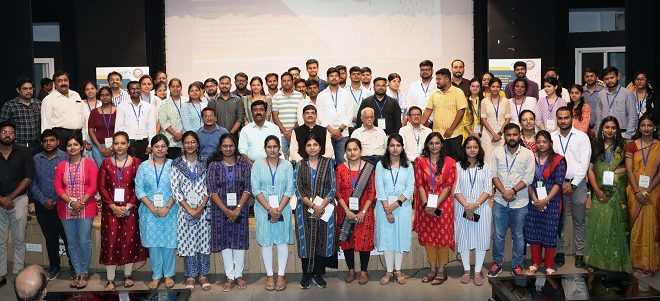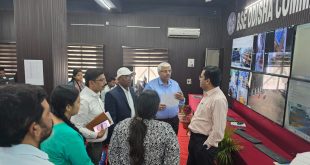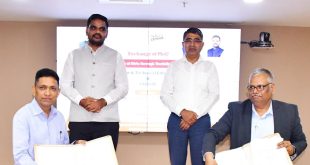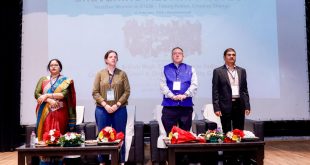Bhubaneswar: An international conference on ‘Sustinable Agricultural Development with Climate Smart Systems’, which was held recently at Siksha ‘O’ Anusandhan Deemed to be University (SOA), focused on preparation of an action plan on region-specific climate smart agriculture to counter the impact of climate change.
The three-day conference, which concluded on Saturday, was attended by a host of experts drawn from academia, industry, research organisations and other stakeholders from across the world who deliberated on the effect of climate variability on agriculture and methods to overcome the obstacles.
The conference was organised by SOA-run Centre for Climate Smart Agriculture (CCSA) in collaboration with the Institute of Agricultural Sciences (IAS), SOA’s faculty of agricultural sciences.
Used as a platform for the scientific community on developing region-specific climate smart cropping systems, the conference recommended use of technological interventions including Artificial Intelligence, drones and automated disease detection to minimise uncertainty, maximise production and reduce Green House Gas (GHG) emission.
Dr. Chittaranjan Ray, Director of the Nebraska Water Centre at the University of Nebraska, emphasized on the digitalization of soil information systems and measuring techniques and mitigation strategies for GHG emission.
Dr. Ray said the big challenge for the new generation would be to provide food for the world population which was expected exceed 9 billion by 2050.
The conference also emphasized strategic measures such as improving feed quality, optimizing manure management and transformative impact of blending traditional waste management practice with modern agricultural technology.
The highlight of the conference, which was inaugurated by Odisha’s Deputy Chief Minister and Minister in charge of Agriculture, Farmers’ Empowerment and Energy, Mr. K.V. Singh Deo, was the experience shared by Mr. Popatrao Baguji Pawar, a social reformer who spearheaded a movement for water conservation in drought prone Hiware Bazar panchayat of Maharashtra which had transformed the region triggering reverse migration of people who had left their villages in search of work elsewhere.
Global warming is seen as causing extreme weather events leading to drought in many places including in Ahmednagar district where Hiware Bazar panchayat was located. As agriculture failed, the people migrated to distant cities in search of livelihood, Mr. Pawar said.
The reformer, who was decorated with Padma Shri for his contribution in combating the situation, rallied the people to take up water and soil conservation measures which had turned the region into a green belt while judicious use of the limited rain water multiplied the crop yield.
People were returning back to their villages to take up agriculture and were now earning Rs. 9 lakh per acre every year as against a few thousand rupees they could make earlier.
Addressing the valedictory session, SOA Vice-Chancellor Prof. Pradipta Kumar Nanda stressed the need for synergy in such endeavours saying it was the age of joint collaboration in the larger interest of the society.
The session was also addressed by Prof. U.C. Mohanty, Distinguised Professor at CCSA, who suggested adoption of few climate smart villages in different agro climatic zones of Odisha. SOA was planning to have an international multi-disciplinary Master’s program on climate smart systems which should encompass the neighbouring countries as well, he said.
Prof. Mohanty said the subject of climate change should become part of school curriculum from Class seven to prepare children to cope with the impact of climate change.
Prof. Santosh Kumar Rout, Dean of IAS, said the university would adopt few climate smart villages and look into the problems faced by the farmers. Prof. Rabindra Kumar Panda, Director of CCSA and Chairman of the conference, presented its recommendations.
He said SOA would develop climate smart villages in a phased manner in collaboration with Odisha University of Agriculture and Technology (OUAT) and the Odisha government.
Pointing out that climate change led to flash flood, heat stress and heavy rainfall besides impacting air quality in urban areas, experts felt the improvement achieved in prediction through coupled urban modeling system needed further improvement through observation and modeling and use of AI and Machine Learning techniques to reduce errors.
 Update Odisha-Latest Odisha News I Breaking News Get latest news on Odisha, Govt. Jobs, OSSC, OPSC, Entertainment, Crime, Sports, and Education
Update Odisha-Latest Odisha News I Breaking News Get latest news on Odisha, Govt. Jobs, OSSC, OPSC, Entertainment, Crime, Sports, and Education



